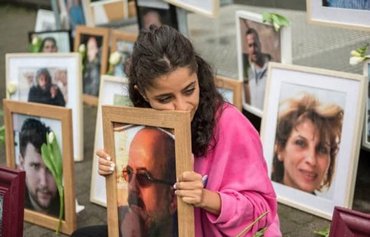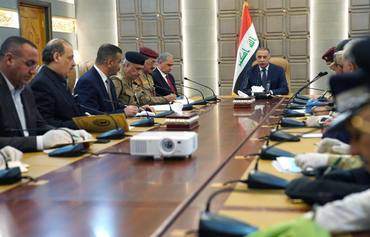The United Nations (UN) General Assembly on Thursday (June 29) created an independent body to "clarify" the fate of thousands of people who remain missing in Syria since 2011, overriding objections from Damascus.
According to non-governmental groups, at least 100,000 people have disappeared since the start of a brutal crackdown on anti-government protests, with the real number expected to be much higher.
More than half a million people have been killed.
After 12 years of conflict and violence in Syria, "little progress has been achieved in alleviating the suffering of families by providing answers as to the fate and whereabouts of all missing persons", the resolution to form the new entity reads.
![Activists and relatives of Syrians suspected of being detained or disappeared by the Syrian regime pose with portraits of missing Syrians during a demonstration in front of Berlin's Brandenburg gate on May 7, 2022. [John MacDougall/AFP]](/cnmi_di/images/2023/07/03/42868-Syria-activists-Berlin-600_384.jpg)
Activists and relatives of Syrians suspected of being detained or disappeared by the Syrian regime pose with portraits of missing Syrians during a demonstration in front of Berlin's Brandenburg gate on May 7, 2022. [John MacDougall/AFP]
![A satellite image of the Syrian regime's Saydnaya prison is seen on a laptop computer on August 12. Up to 100,000 people have died in Syrian regime prisons since 2011. Around 30,000 people are thought to have been held at Saydnaya alone since the start of the conflict. Only 6,000 were released. Most of the others are officially considered missing. [Omar Haj Kadour/AFP]](/cnmi_di/images/2023/07/03/42869-Saydnaya-prison-laptop-600_384.jpg)
A satellite image of the Syrian regime's Saydnaya prison is seen on a laptop computer on August 12. Up to 100,000 people have died in Syrian regime prisons since 2011. Around 30,000 people are thought to have been held at Saydnaya alone since the start of the conflict. Only 6,000 were released. Most of the others are officially considered missing. [Omar Haj Kadour/AFP]
It passed with 83 votes in favour, 11 opposed and 62 abstentions.
"This resolution does not point finger at anyone," the representative of Luxembourg said, introducing the text. "It has only one goal -- and it is a humanitarian goal."
The Independent Institution on Missing Persons in the Syrian Arab Republic will "clarify the fate and whereabouts of all missing persons" and "provide adequate support to victims, survivors and the families of those missing".
Syria, along with Russia, China and Iran, objected to the new body, with Syria claiming the draft "clearly reflects flagrant interference in our internal affairs" and accusing "certain Western states" of a hostile approach against Syria.
'They are not statistics'
The US delegate in turn recalled that the core group and the UN had attempted to engage with Damascus on this effort, but their efforts were rebuffed.
The institution seeks to defend those people who are missing and/or detained "with the full life yet to live", he said.
"They are not statistics," he added. "They are spouses, children, siblings, parents, friends, colleagues."
The resolution calls for the UN secretary-general, the UN high commissioner for human rights and other relevant parties to define the new organisation's mandate in the next 80 days.
It also requests that the UN secretary-general report on the resolution's implementation within 100 days of its adoption, while reporting on the institution's activities on an annual basis.
"A much-needed initiative! Families have right to know fate & whereabouts of loved ones, to help heal society as a whole," the UN Human Rights Office said on Twitter.
Human Rights Watch said the new organisation needs to have the right tools at its disposal to do its job.
"UN member countries should ensure that this new institution has the staff and resources necessary to determine what happened to so many thousands of people who vanished during Syria's 12 years of conflict," the group's UN director Louis Charbonneau said in a statement.
"The people of Syria deserve no less."
Fate of the missing
Thursday's vote came after UN chief António Guterres called for the formation of such a body in a report in August, saying families should not have to go through the trauma of investigating the whereabouts of missing relatives themselves.
"As a family association representative said, 'Just imagine looking through leaked videos of massacres (on social media) to see if your loved one is among the decapitated, mutilated bodies over and over, desperately conducting your own search'," he said.
"Women-led households in particular should not have to put themselves at risk to search for their missing relatives, nor impoverish themselves in an economic environment that is already dire and where survival is precarious, in order to claim basic rights."
Many Syrians have strong suspicions about the likely fate of the conflict's missing and disappeared.
Torture in the regime's prisons is "well-known and widespread", Syrian activist Mohammed al-Beik told Al-Mashareq in January.
Al-Beik said he made a significant observation after Bashar al-Assad announced he was releasing "hundreds" of prisoners during a mass amnesty on Eid al-Fitr in May of 2022, some of whom had been incarcerated for close to a decade.
He noticed that "some of the detainees whose names are included on the lists of released detainees are nowhere to be found".
He and other activists formed investigation teams to track down some of those prisoners, he said, "but none were found at all, and their families deny their return from detention".
"Some of the families did not even know that their sons were being held in detention centres," he said.
"When the families asked the detention centres about them, they were assured that they had been released on specific dates, as documented in their records," he added.
Reading between the lines, the picture this presents is chilling.
"The regime is getting rid of any evidence of death of detainees under torture, so it puts up this pretense, turning the detainee into a forcibly disappeared person, and thus absolves itself of responsibility," al-Beik said.

![Syrian artist Aziz Asmar draws a mural with the inscription 'The detainees are our open wound' as families and relatives of detainees and missing persons take part in a rally demanding information on their loved ones, in the Aleppo town of Azaz on January 7, 2022. [Bakr Alkasem/AFP]](/cnmi_di/images/2023/07/03/42867-Syria-missing-mural-600_384.jpg)





